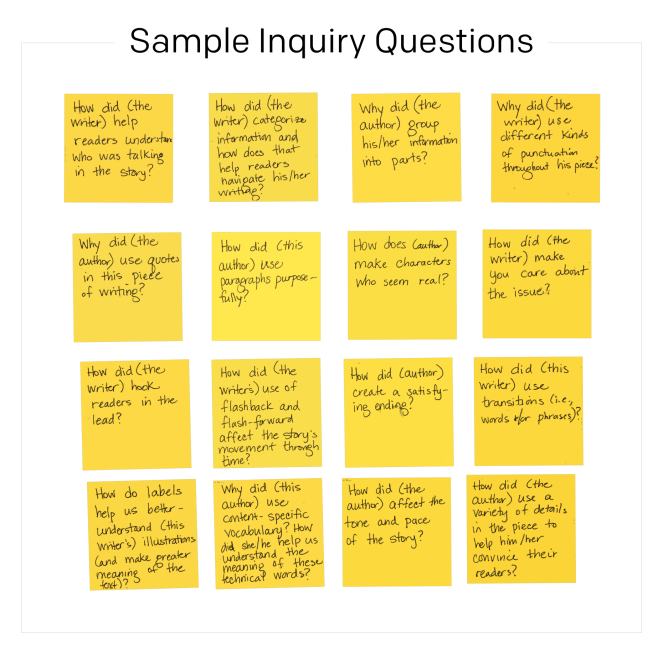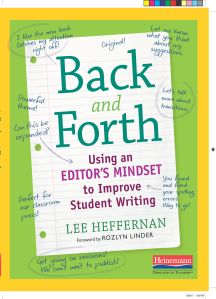 My daughter, Isabelle, recently turned seven. She was looking forward to a birthday cake from the Wegmans bakery. A few days before her birthday party, I discovered one of her friends only eats food that is certified Kosher, which meant she wouldn’t be able to eat the party cake since Wegmans’ bakery doesn’t have a Kosher certification. Even though I could’ve changed the cake order on my own, I wanted to lead my daughter on an inquiry — of sorts — to see what kind of answers she could find to the problem.
My daughter, Isabelle, recently turned seven. She was looking forward to a birthday cake from the Wegmans bakery. A few days before her birthday party, I discovered one of her friends only eats food that is certified Kosher, which meant she wouldn’t be able to eat the party cake since Wegmans’ bakery doesn’t have a Kosher certification. Even though I could’ve changed the cake order on my own, I wanted to lead my daughter on an inquiry — of sorts — to see what kind of answers she could find to the problem.- At the beginning of a unit or bend: If you want students to draw upon the things they already know about writing, then you might teach an inquiry minilesson at the start of a unit of study or at the beginning of a new bend.
- At the end of a bend in the road: After you’ve taught several lessons to students in a unit, you might teach an inquiry minilesson since it allows for more independence. This kind of lesson requires a higher level of thinking so kids will be drawing upon the strategies you’ve taught them to answer the inquiry question.
- Anytime students have acquired a lot of knowledge: Whenever you feel students possess a good deal of knowledge about writing in a particular genre or the writing process, you might include an inquiry minilesson that will allow them to posit about why a writer may have done something in a particular way.
Whole Class Instruction in Opinion Writing: Teaching for Transfer as Students Move Between Persuasive Speeches and Petitions 3-5 from TC Reading and Writing Project on Vimeo.
Connection: Remind kids of something familiar. Perhaps remind kids of some prior knowledge, or a story from your classroom, or an anecdote from your own personal life that will connect to today’s teaching point.
Name the Inquiry Question: Name the question your kids will be thinking about. Be explicit about the question, unless you are inviting kids to come up with their own questions. In that case, the kids should name their questions clearly at this stage of the minilesson. Perhaps you’ll invite students to examine a mentor text, asking, “What does this writer do that I could do in my own writing?” Or for another example, maybe you’ll ask kids to observe two partners at work, thinking, “What do I notice these partners doing that is helpful to each other?”
Inquiry Set-Up: This is where the kids will actually do the inquiry. Plan that it will be short, probably a few minutes is plenty. For example, you might read a page or two of a mentor text, or ask a partnership to have a conversation while the rest of the class looks on. You might model some of your own “noticings” at this point to set the stage. (For a longer, more involved inquiry, the minilesson is probably not the right structure. Maybe your designated read-aloud or a separate time set aside for an in-depth inquiry would make more sense.)
Active Engagement: This is where kids might talk to a partner about what they noticed, or jot something down on a post-it, or maybe even try something in their own writing. Just like in a classic minilesson, this should be something brief for kids to try, just a small sample. In an inquiry, it may help to chart some of the “noticings” to help kids remember the lesson later.
Link: As always, this is where you can make it very clear to kids what the choices are for their ongoing work. In an inquiry, there are usually multiple things that the kids have gleaned from whatever it was they studied, whether it was studying a mentor text, or watching a partnership work together. The list of noticings gets added to the many other strategies they can choose from.

- Keep an eye on the time! Inquiry minilessons can go long (and off the rails) if you aren’t watching the clock.
- You want to give students the time to write after the minilesson.
- Just like a traditional minilesson, students should leave an inquiry minilesson excited to do similar work in their own writing.
- Pose a question rather than directing students towards a strategy.
- Let kids figure out what the writer has done so they can do similar work as writers.
- Remember to pose a question that has more than one “right” answer. There should be several correct answers to your question.
- Inquiry-Based Centers in Grades 3-8
- Inquiry Stance
- Minilessons: Writing Workshop Fundamentals
- The Problem with Q&A
- There Are More Ways Than One to Teach a Minilesson
- A Place for Wonder: Reading and Writing Nonfiction in the Primary Grades by Georgia Heard and Jennifer McDonough (Stenhouse, 2008)
- The Art of Teaching Writing, New Edition by Lucy McCormick Calkins (Heinemann, 1994)
- The Curious Classroom: 10 Structures for Teaching with Student-Directed Inquiry by Harvey “Smokey” Daniels (Heinemann, 2017)
- The Power of Grammar: Unconventional Approaches to the Conventions of Language by Mary Ehrenworth and Vicki Vinton (Heinemann, 2005)
- What You Know by Heart: How to Develop Curriculum for Your Writing Workshop by Katie Wood Ray (Heinemann, 2002)
Giveaway Information:
 This giveaway is for a copy of Back and Forth: Using an Editor’s Mindset to Improve Student Writing by Lee Heffernan. Thanks to Heinemann Publishers for donating a copy for one reader. (You must have a U.S. mailing address to enter this giveaway.)
This giveaway is for a copy of Back and Forth: Using an Editor’s Mindset to Improve Student Writing by Lee Heffernan. Thanks to Heinemann Publishers for donating a copy for one reader. (You must have a U.S. mailing address to enter this giveaway.)- For a chance to win this copy of Back and Forth: Using an Editor’s Mindset to Improve Student Writing, please leave a comment about this or any blog post in this blog series by Sunday, February 11th at 7:00 p.m. EDT. Melanie Meehan will use a random number generator to pick the winner’s commenter number. His/her name will be announced in the ICYMI blog post for this series on Monday, February 12th.
- Please leave a valid e-mail address when you post your comment so Melanie can contact you to obtain your mailing address if you win. From there, our contact at Heinemann will ship the book to you. (NOTE: Your e-mail address will not be published online if you leave it in the e-mail field only.)
- If you are the winner of the book, Melanie will email you with the subject line of TWO WRITING TEACHERS – BACK AND FORTH BOOK. Please respond to her e-mail with your mailing address within five days of receipt. Unfortunately, a new winner will be chosen if a response isn’t received within five days of the giveaway announcement.


I love this idea of an inquiry based mini lesson! It’s given me new inspiration to try one of my own rather than only demonstrating a concept to kids!
LikeLike
I love inquiry lessons! We just did one at the beginning of a literary essay unit and it was powerful!
LikeLiked by 1 person
love this idea of minilesson. thanks for sharing
LikeLike
Thanks so much for this incredibly thorough post, Stacey! I appreciate the embedded video, sample questions, and steps from Beth’s post! I also appreciate the chance to win the book! : )
LikeLike
This is great! I don’t know how much I have thought of a writing minilesson as an inquiry lesson.I think inquiry is so often related to science. I love the “How to write an inquiry minilesson”. The sample questions and videos are helpful as well! Thanks for pushing my thinking.:)
LikeLike
It’s worth a try! Inquiries definitely lead students to deeper thinking.
LikeLike
Thank you for the samples! Always helpful!
LikeLike
I appreciate the modeling of this example. I’m teaching 7th grade ELA and transitioning to a workshop modal with more mini-lessons. However, I’ve seen very few mini-lessons done in full and this was a very helpful example. Thanks!
LikeLike
Check out the other videos on TCRWP’s Vimeo Page. It’s a gold mine!
LikeLike
Thank you for this awesome scaffold for us teachers ready to start this inquiry work in our classrooms!! I love this as an organic and authentic way to study author’s craft and let my students guide the learning! Thank you!
LikeLike
This is just what I needed. I was getting bored with my own ideas for mini-lessons and if I’m bored, I know my kids will be too.
LikeLike
Smart thinking!
Do check out Beth’s post (which I linked to above) called “There Are More Ways Than One to Teach a Minilesson.” You’ll find more ideas there.
LikeLike
Sometimes inquiry can be overwhelming but these steps are really helpful.
LikeLike
Inquiry lessons are overwhelming in the beginning. Before you try it with your whole class, perhaps you’d like to try leading some small groups in inquiry work during independent writing time. Once you’ve practiced doing small group inquiries — and feel comfortable with it — you can transition to doing inquiry minilessons.
LikeLike
Stacey,
So important to put “Inquiry” as a part of student ownership back into Writing Workshop. And all these resources, YAY! Thanks so much!
I’m also wondering if another great “place” for inquiry is to naturally reinforce the reading and writing connections for students. Will it all be “stickier” if students do the work?
LikeLike
I adore that idea, Fran!
LikeLike
I love these ideas. Definitely a step I need to take.
LikeLike
These ideas are so great! As a first year writing teacher, I am so glad to have found your blog!
LikeLike
Wow! This post came at just the right time.The 5k classes are beginning an inquiry. This post is a perfect way to support the teachers in getting started. the explicit steps to writing a mini-lesson are beneficial to all teachers.
Thank you!
LikeLiked by 1 person
I’m thankful Beth allowed me to borrow them from her older post. They’re quite clear, aren’t they?
LikeLike
Such a thorough post. Love the list of questions to help students pay attention to craft and choices authors make. Thanks for the chance to win the book.
LikeLiked by 1 person